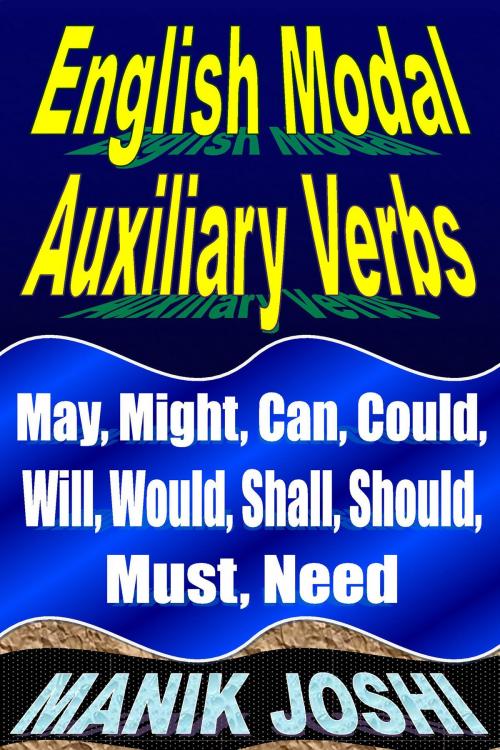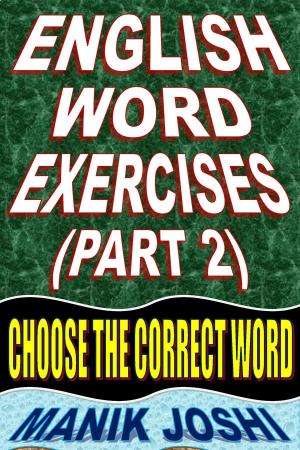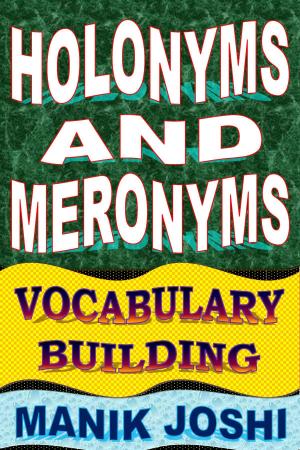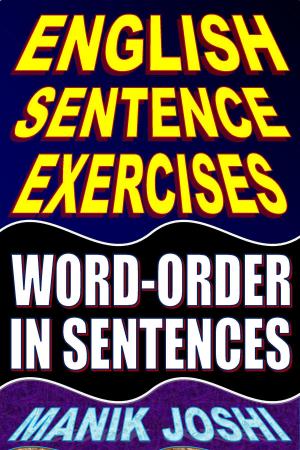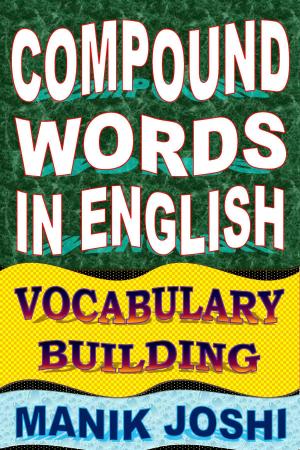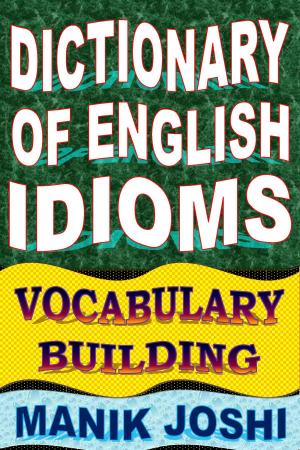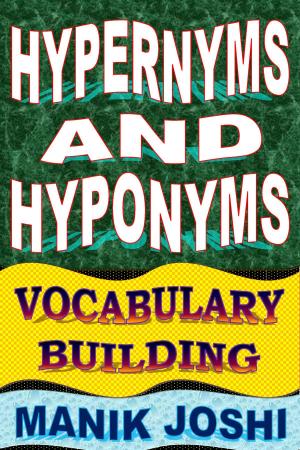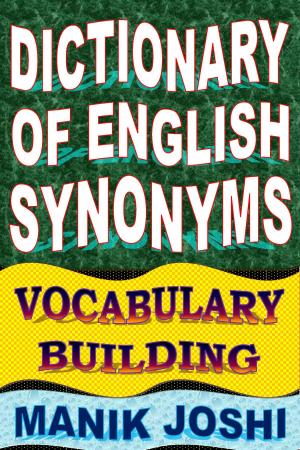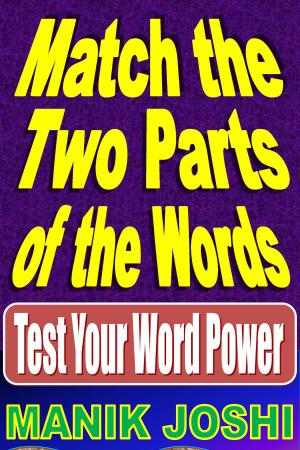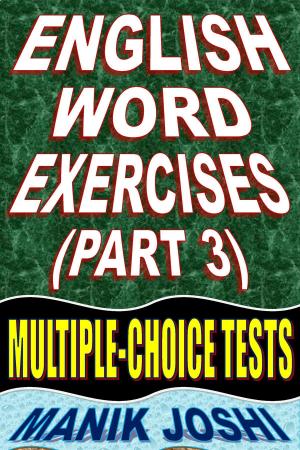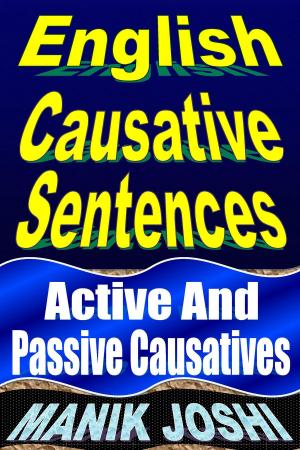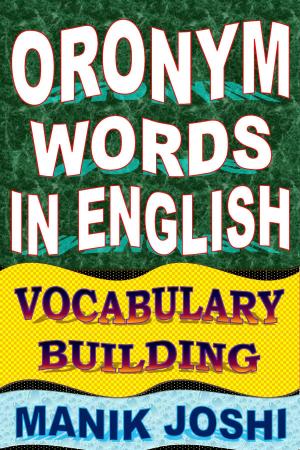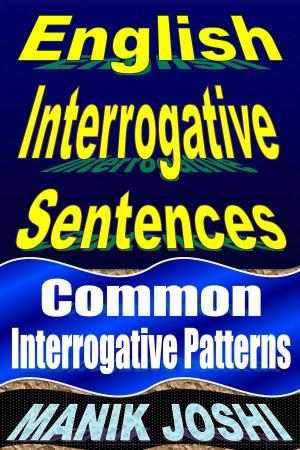English Modal Auxiliary Verbs: May, Might, Can, Could, Will, Would, Shall, Should, Must, Need
Nonfiction, Reference & Language, Education & Teaching, Teaching, Language Experience Approach, Study Aids, ESL, Foreign Languages| Author: | Manik Joshi | ISBN: | 9781301447329 |
| Publisher: | Manik Joshi | Publication: | February 4, 2013 |
| Imprint: | Smashwords Edition | Language: | English |
| Author: | Manik Joshi |
| ISBN: | 9781301447329 |
| Publisher: | Manik Joshi |
| Publication: | February 4, 2013 |
| Imprint: | Smashwords Edition |
| Language: | English |
Modal Auxiliary Verb (or ‘Modal Verb’ or ‘Modal Auxiliary’) is a verb that is used with another verb (not a modal verb) to express ability, intention, necessity, obligation, permission, possibility, probability, etc.
English modal auxiliary verbs - may, might, can, could, will, would, shall, should, must, need, used(to), ought(to), dare | different patterns and examples | may and might are used to express- possibility, compulsion, obligation, probability (in present and future) | can, could are used to express- ability, probability, possibility, suggestion, request, condition | will, would are used to express- action in future, present habit, compulsion, obligation | shall, should are used to express- action in future, suggestion, surprise, importance or purpose | need is used to express necessity | used(to) is used to express- past habit | ought(to) is used to express- probability, recommendation, obligation, advise | dare is used to express– be brave enough to
Sample This:
Modal Auxiliary Verb -- May and Might
‘May’ and ‘Might’ are used to show Possibility and Probability
‘May’ and ‘Might’ are used to ask for Permission
‘May’ is used to give or refuse Permission
Some Important Uses of ‘May’ and ‘Might’
To say what the purpose of something is
We eat that we may live.
Her prayer was that the child might live.
That he might be well fed his mother starved herself.
To admit that something is true before introducing another point, argument, etc.
You may not return to past glory, but don't stop believing.
City may not have the roads to drive sports car, but it has excellent infrastructure.
It may not be wise, but using force may be lawful.
I may not have deserved the house I bought, but I'm glad I own it.
He may not have been loved, but he was respected.
We may have had to go without food, but he is very considerate.
‘May’ is used to express wishes and hopes
May you live prosperous life!
‘May’ is used to give or refuse Permission [In Informal and Polite Way]
You may contact us for queries regarding donations.
When you have finished your work you may go home.
Note: Never use ‘might’ to give permission. [Always use ‘may’]
Never use ‘might not’ to refuse permission. [Always use ‘may not’]
Difference between ‘May’ and ‘Might’
Note: ‘Might’ is the past equivalent of ‘may’ in indirect speech.
But it is used in the same way as ‘may’ to talk about the present or future.
‘May’ denotes more possibility/probability
‘Might’ denotes less possibility/probability
It may rain tomorrow (Perhaps a 75% chance) - More possible
It might rain tomorrow (Perhaps a 50% chance) - Less possible
‘Might’ also denotes ‘would perhaps’
You might attract President’s attention later. (= Perhaps you would attract.)
He might have to go (Perhaps he had to go.)
‘Might’ is frequently used In conditional sentences
If I pursued studies further, I might learn more.
If I had pursued studies further, I might have learned more.
‘Might’ has limitations while ‘asking permission’
‘Might’ is very polite and formal. It is not common. It is mostly used in indirect questions.
I wonder if I might work on your computer.
Note: ‘Maybe’ is an adverb. [‘Maybe’ means ‘perhaps’]
Maybe he came to know something secret and was removed from the post.
ALSO NOTE:
Difference Between ‘May’ and ‘Can’
‘May’ is more formal than ‘Can’
‘May’ is mostly used in ‘formal’ English.
‘Can’ is mostly used in ‘informal’ (or spoken) English
Modal Auxiliary Verb (or ‘Modal Verb’ or ‘Modal Auxiliary’) is a verb that is used with another verb (not a modal verb) to express ability, intention, necessity, obligation, permission, possibility, probability, etc.
English modal auxiliary verbs - may, might, can, could, will, would, shall, should, must, need, used(to), ought(to), dare | different patterns and examples | may and might are used to express- possibility, compulsion, obligation, probability (in present and future) | can, could are used to express- ability, probability, possibility, suggestion, request, condition | will, would are used to express- action in future, present habit, compulsion, obligation | shall, should are used to express- action in future, suggestion, surprise, importance or purpose | need is used to express necessity | used(to) is used to express- past habit | ought(to) is used to express- probability, recommendation, obligation, advise | dare is used to express– be brave enough to
Sample This:
Modal Auxiliary Verb -- May and Might
‘May’ and ‘Might’ are used to show Possibility and Probability
‘May’ and ‘Might’ are used to ask for Permission
‘May’ is used to give or refuse Permission
Some Important Uses of ‘May’ and ‘Might’
To say what the purpose of something is
We eat that we may live.
Her prayer was that the child might live.
That he might be well fed his mother starved herself.
To admit that something is true before introducing another point, argument, etc.
You may not return to past glory, but don't stop believing.
City may not have the roads to drive sports car, but it has excellent infrastructure.
It may not be wise, but using force may be lawful.
I may not have deserved the house I bought, but I'm glad I own it.
He may not have been loved, but he was respected.
We may have had to go without food, but he is very considerate.
‘May’ is used to express wishes and hopes
May you live prosperous life!
‘May’ is used to give or refuse Permission [In Informal and Polite Way]
You may contact us for queries regarding donations.
When you have finished your work you may go home.
Note: Never use ‘might’ to give permission. [Always use ‘may’]
Never use ‘might not’ to refuse permission. [Always use ‘may not’]
Difference between ‘May’ and ‘Might’
Note: ‘Might’ is the past equivalent of ‘may’ in indirect speech.
But it is used in the same way as ‘may’ to talk about the present or future.
‘May’ denotes more possibility/probability
‘Might’ denotes less possibility/probability
It may rain tomorrow (Perhaps a 75% chance) - More possible
It might rain tomorrow (Perhaps a 50% chance) - Less possible
‘Might’ also denotes ‘would perhaps’
You might attract President’s attention later. (= Perhaps you would attract.)
He might have to go (Perhaps he had to go.)
‘Might’ is frequently used In conditional sentences
If I pursued studies further, I might learn more.
If I had pursued studies further, I might have learned more.
‘Might’ has limitations while ‘asking permission’
‘Might’ is very polite and formal. It is not common. It is mostly used in indirect questions.
I wonder if I might work on your computer.
Note: ‘Maybe’ is an adverb. [‘Maybe’ means ‘perhaps’]
Maybe he came to know something secret and was removed from the post.
ALSO NOTE:
Difference Between ‘May’ and ‘Can’
‘May’ is more formal than ‘Can’
‘May’ is mostly used in ‘formal’ English.
‘Can’ is mostly used in ‘informal’ (or spoken) English
